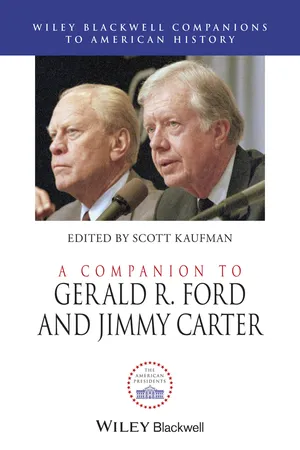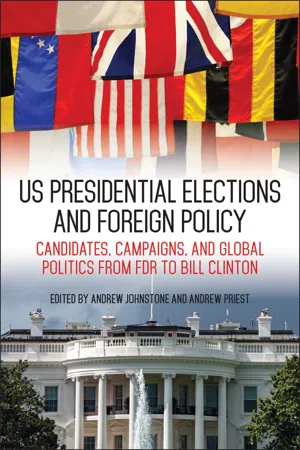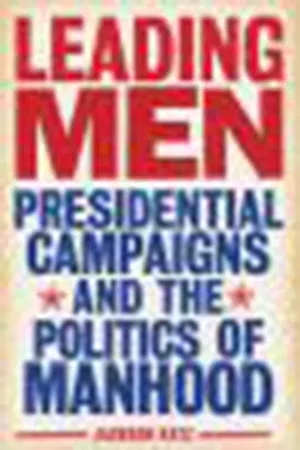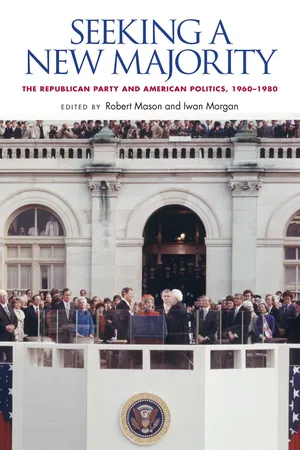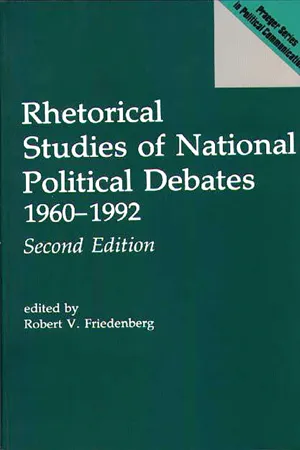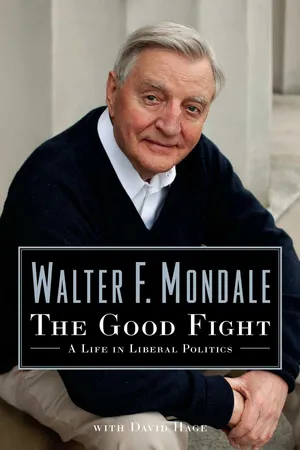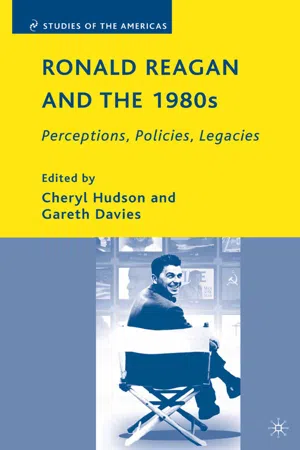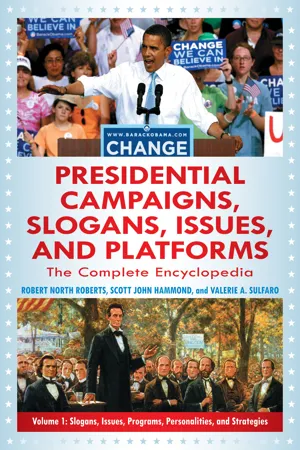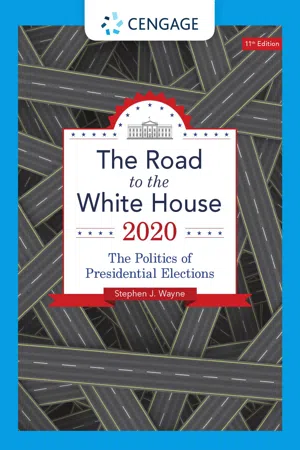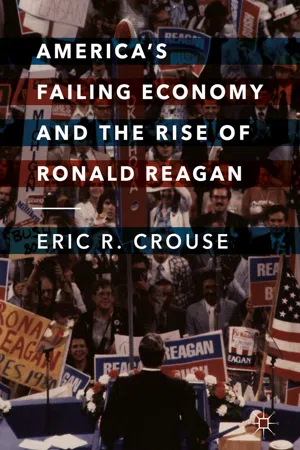History
1980 Presidential Election
The 1980 election in the United States saw Republican candidate Ronald Reagan defeating incumbent President Jimmy Carter. Reagan's victory marked a shift towards conservative policies and a more assertive foreign policy. The election is often remembered for its focus on economic issues, the Iran hostage crisis, and the beginning of a new era in American politics.
Written by Perlego with AI-assistance
Related key terms
1 of 5
10 Key excerpts on "1980 Presidential Election"
- eBook - ePub
- Scott Kaufman(Author)
- 2015(Publication Date)
- Wiley-Blackwell(Publisher)
Chapter Twenty-Six The Election of 1980 Andrew E. Busch The election of 1980 pitted Jimmy Carter against Massachusetts Senator Edward M. Kennedy and California Governor Edmund “Jerry” Brown in the Democratic primaries and caucuses, and Carter against former California Governor Ronald Reagan and Republican-turned-Independent Congressman John Anderson of Illinois in the general election. Down in the polls in the summer of 1979, Carter won his renomination against Kennedy and Brown, only to fall in the general election to Reagan. Indeed, despite a campaign during which the two major candidates seemed to be running neck and neck, Reagan won 51 percent of the nationally-aggregated popular vote in a three-way race, attaining a ten-percentage-point margin over Carter. In the Electoral College, Reagan’s win was even more decisive, with the former California governor winning all but six states and the District of Columbia and outpacing Carter 489 to 49 in electoral votes. Anderson finished with 7 percent nationally, far less than he had polled in September but enough to receive federal election funds in 1980 and (if he ran again) 1984. Reagan’s victory was accentuated by big Republican gains in Congress, raising questions whether 1980 represented an ideological mandate for Reagan or even the beginning of a realignment. The Political Context When British political scientist Anthony King edited The New American Political System (1978b), he and the other contributors sketched a comprehensive picture of the political environment, especially institutional, within which the election of 1980 would take place. Samuel Beer, for example, argued that the New Deal idea had ceased to serve as a unifying principle in American politics but that a new dominant “public philosophy” had yet to emerge - eBook - ePub
US Presidential Elections and Foreign Policy
Candidates, Campaigns, and Global Politics from FDR to Bill Clinton
- Andrew Johnstone, Andrew Priest, Andrew Johnstone, Andrew Priest(Authors)
- 2017(Publication Date)
- The University Press of Kentucky(Publisher)
At the polls a week later, Americans gave the victory to Reagan, unexpectedly by a landslide. In the popular vote, his margin over Carter was 50.8 to 41.0 percent; John B. Anderson, a disillusioned liberal Republican running as an independent, picked up 6.6 percent. Republican success in winning control of the Senate for the first time since 1952, together with gains in the House of Representatives, further encouraged the view that the 1980 elections marked a turn toward conservatism, perhaps even a realignment and the start of a new Republican-dominated era in American politics. This was an election in which foreign policy played a complex role, wrapped in perceptions of American decline. First, the background to the contest was a significant shift in public opinion on foreign policy, which became more supportive of interventionism. Second, the Carter years witnessed a conservative revitalization that was partly grounded in a critique of apparent decline. And, third, as the White House incumbent at a time of economic challenges, Carter saw foreign policy as presenting his most promising case for reelection. All these factors boosted the significance of foreign policy in the presidential contest even if the domestic dimension of decline—such as high unemployment and high inflation—probably retained more influence on the outcome. This did not amount to an electoral realignment, but it did signal a desire for a new direction both at home and overseas.Foreign Policy in 1980Election Day in 1980 was the one-year anniversary of a landmark event for the United States overseas. On November 4, 1979, a group of Iranian students took sixty-six Americans hostage at the US embassy in Tehran; a year later, as Americans went to the polls to choose among Carter, Reagan, and Anderson, fifty-two hostages remained in captivity. It was against the backdrop of the hostage crisis that the 1980 presidential campaign took place. The crisis at first fostered support for Jimmy Carter in a striking example of the rally-’round-the-flag effect but in time raised questions about his leadership.5 Vividly and painfully exemplifying the limits of US power overseas, the hostage crisis fed a resurgence in patriotic sentiment. As they followed the events, “most [Americans],” the historian David Farber writes, “became increasingly certain of one thing: the United States had lost its way—economically, culturally, politically, and even militarily.” Despite the political cynicism that had taken hold during the 1970s in the shadow of Vietnam and Watergate, “Americans demonstrated both a sometimes fierce, even xenophobic nationalism and an emotional bond to their fellow Americans held captive in Iran.”6 - eBook - ePub
Leading Men
Presidential Campaigns and the Politics of Manhood
- Jackson Katz(Author)
- 2012(Publication Date)
- Interlink Books(Publisher)
Chapter 3
1980: Reagan vs. Carter
The 1980 election was a watershed election in American politics for many reasons, not least of which is that Ronald Reagan’s superlative performance of presidential masculinity continues to loom large in contemporary presidential politics. But 1980 was not the first electoral contest between competing versions of masculinity, nor was it the first election in which media figured prominently. Among political historians there is widespread agreement that the 1960 race between Richard M. Nixon and John F. Kennedy was the first presidential campaign in which television played a decisive role, mostly because in a televised debate the camera loved Kennedy and showed Nixon’s sweaty brow and less-than-endearing five o’clock shadow. Constructed and mediated images of presidential masculinity had long been important in presidential races, even before the mass media technologies of the twentieth century. But since the invention of television, and particularly since 1960, the way a candidate for president performs his manhood in the media spectacle of presidential campaigns has not merely been an important part of his “electability”; it has arguably been the most important part. Especially since the 1980 Electoral College landslide victory of Reagan—a former Hollywood actor—effective televisual performance, including the ability to project “manly” strength, has become the sine qua non of success at the presidential level. - eBook - PDF
Seeking a New Majority
The Republican Party and American Politics, 1960-1980
- Robert Mason, Iwan Morgan, Robert Mason, Iwan Morgan(Authors)
- 2013(Publication Date)
- Vanderbilt University Press(Publisher)
Most people remained smack in the middle of the ideological spectrum. “There was no party realignment in 1980,” said Reagan’s pollster Richard Wirthlin, who knew what he was talking about. 32 In many ways, in fact, the real story of 1980 was not Reagan’s victory but Cart-er’s defeat. In a Time magazine poll, only one in four voters thought the election was a “mandate for more conservative policies,” while 63 percent agreed that the election was “mostly a rejection of President Carter.” And the single most impor-tant issue was not abortion, crime, or even Iran, but the economy—which is why Reagan’s “Are you better off than you were four years ago?” refrain in the presi-dential candidates’ only debate struck such a chord. No incumbent president had ever won reelection with such a poor economic record. “We never had a chance of winning that campaign,” Hamilton Jordan admitted many years later. “It was only ultimately a nagging doubt about Ronald Reagan that kept that race close up until the final days.” 33 Since any election is, to an extent, a referendum on the incumbent, there is a case that Reagan won in 1980 merely because Carter’s presidency had been such a fiasco. And yet that does not explain why so many people at the time thought that the election had been a watershed, or why the Republicans had such spectacular success at kicking out established liberal Democrats such as Senators Birch Bayh of Indiana, Frank Church of Idaho, and George McGovern of South Dakota, or why they had done so well in 1978, or why the Democrats would struggle to re-gain their former glory in the 1980s. To focus merely on Carter’s mistakes, and to conclude that Reagan won only because of luck or the turn of events, is to miss the point that American politics had actually already shifted rightward, thanks to the elections of 1968, 1972, and 1976. - eBook - PDF
- Robert V. Friedenberg(Author)
- 1993(Publication Date)
- Praeger(Publisher)
Chapter 4 The 1980 Reagan-Carter Presidential Debate Kurt Ritter and David Henry The presidential debate between Ronald Reagan and Jimmy Carter came at the climax of the 1980 presidential campaign. It was fitting that a major media event such as the debate should cap the campaign, for the campaign marked the end of a turbulent decade of American politics in which the news media had played a central role. Both Reagan and Carter were products of the media politics of the 1970s. In 1970 Reagan was winning reelection as governor of California and was still regarded as a curiosity in national politics: an actor in public office. In the same year, Jimmy Carter was winning an upset election for governor of Georgia. A new figure on the political scene, Carter would storm into presidential politics with a media blitz in 1976. As their political careers progressed, Reagan and Carter watched the Watergate scandal and its attendant media coverage drive Richard Nixon out of the White House. The two men came close to running against each other in 1976 when Carter was the Democratic candidate for pres- ident and Reagan lost the Republican nomination by the closest of mar- gins. Carter won election as president, in part, on the strength of his performance in television debates with President Gerald Ford. But the television medium that had been an asset to Carter in 1976 became a liability during his term as president. Television news dramatized the energy crisis, the nation's weak economy, and above all, the Iran hostage crisis. Television was no less important in the 1980 presidential campaign. Jimmy Carter secured renomination as the Democratic candidate in no small part because his rival, Senator Edward Kennedy of Massachusetts, had self-destructed in November 1979 during a television interview with 70 RHETORICAL STUDIES OF NATIONAL POLITICAL DEBATES Roger Mudd. - eBook - ePub
The Good Fight
A Life in Liberal Politics
- Walter Mondale, David Hage(Authors)
- 2010(Publication Date)
- Scribner(Publisher)
13
The Election of 1980ANY CONVENTIONAL POLITICAL history would recount 1980 as the year Ronald Reagan defeated Jimmy Carter for president and launched the Reagan Revolution in American politics. For me, however, that election had a painful prologue and a long backstory. For 1980 was also the year when Ted Kennedy challenged Jimmy Carter for the Democratic presidential nomination. That struggle pitted a dear friend of mine against a president who had won my admiration and loyalty, put me in the middle of a fight over the future of the Democratic Party, and caused me to think that fate would always find a way to place me in battle against the Kennedys.I had suspected Ted might challenge us as far back as the party’s 1978 midterm conference in Memphis. With his famous “sail against the wind speech,” Ted delivered an appeal for the loyalty of the party and a critique of our administration. I left Memphis wondering if he was laying the foundation for a White House run.I got confirmation one evening in November 1979, the night before Ted announced. He called me at home and said, “Fritz, I’m going to run for president.” I told him, “I’m very sorry that you’re going to do this. I appreciate being told about it, but I want you to know we don’t intend to leave voluntarily, and this is going to get rough. We can both say it won’t, and we can both hope it will be nice and pleasant. But it won’t be, and we’re going to tear the party apart and it’s going to be hard for us to win in November.”I knew Ted well by then, and I could understand his aspirations. The Kennedys had suffered through assassinations, heartaches, and disappointments. They believed they had been robbed of the chance to fulfill the promise of Camelot. The speech that Kennedy gave at the 1980 Democratic National Convention, when he said “the dream will never die,” was not all hokum. A lot of people were carrying a torch for Jack Kennedy and Bobby Kennedy, and they saw it as a mission, even a duty, to get a Kennedy in the White House again. - eBook - PDF
Ronald Reagan and the 1980s
Perceptions, Policies, Legacies
- C. Hudson, G. Davies, C. Hudson, G. Davies(Authors)
- 2008(Publication Date)
- Palgrave Macmillan(Publisher)
The 1980s, by contrast, yielded a “Reagan revolution,” featuring the start of the second long boom of the post–World War II era; a resurgence in entrepreneurial energy; a revival in the nation’s global standing and military preparedness; an end to conf iscatory taxation; and a def initive end to the misguided social theories of the Great Society era. 1 CHERYL HUD SO N AND GARETH DAVIE S 2 On the other hand, l iberal and lef t-leaning commentators have frequent ly presented the 1980s much less triumphantly , associating them with a ver y different kind of turning point. 2 According to them, the decisive pol itical shift to the right entailed slashing attacks on the welfare state; the replace- ment of détente with saber-rattling rhetoric and a massive arms build-up; t he abandonment of efforts to promote racial integration in schools; massive increases in socioeconomic inequal ity; the advent of a casino economy orga- nized around the guiding ethic that “greed is good”; and callous official disregard in the face of the AIDS and crack cocaine epidemics. For all their stark differences, characterizations such as t hese have shared the sense t hat the 1980 election was a critical turning point in American pol itical history, and that Reagan was an unusually consequential presi- dent. How do those claims look from an early-twent y-f irst-centur y vantage point? By some measures, Reagan rides higher in the saddle than ever. On his death in 2004, it was not just conservative partisans who eulogized his leadership—so too did his Democratic successor-but-one as president, Bill Cl inton, even though he had campaigned hard against Reagan’s legacy in 1992. Meanwhile, the nation’s current affairs and recent history bookshelves creak with hagiographic assessments of that legacy from conservatives, whi le rival Republ ican candidates for the 2008 presidential nomination vied with one another to enwrap themselves in Reagan’s magical aura. - eBook - ePub
Presidential Campaigns, Slogans, Issues, and Platforms
The Complete Encyclopedia [3 volumes]
- Robert North Roberts, Scott John Hammond, Valerie A. Sulfaro(Authors)
- 2012(Publication Date)
- Greenwood(Publisher)
History of American Presidential Elections, 1789–1984, vol. 9 (New York: Chelsea House, 1986).Passage contains an image
Campaign of 1988
In 1984, President Ronald Reagan was reelected by a convincing landslide, but beginning in 1985 and running through 1987, a series of episodes significantly reduced public trust in the Reagan administration in particular and the Republican Party in general. High level Reagan administration officials were implicated in what was called by the press the Iran-Contra scandal, a convoluted scheme to sell American military parts to Iran, which only a few years earlier had, in violation of international law and the standards of common decency, held American diplomats hostage during the latter months of the Carter administration and that had referred to the United States as the “Great Satan.” The military parts were exchanged for Iranian help in releasing a different set of American hostages that were at that time being held in Lebanon. The proceeds from the sale of the spare parts and weapons were then illegally diverted to a covert program underwriting the Nicaraguan Contras in their insurgent campaign against the Marxist Sandinista government. For a time, the scandal appeared on the verge of toppling the Reagan presidency—more than one member of Congress was prepared to submit articles of impeachment—and the president himself seemed to be either evading the responsibility or was clueless about the events behind the scandal, the latter a possibility that for some was equally worrisome. Additionally, on October 19, 1987, the stock market lost 22.6 percent of its value, raising new fears about the viability of the nation’s recent economic recovery, which had, to this point, been largely attributed to the administration’s policies. - No longer available |Learn more
- Stephen Wayne(Author)
- 2019(Publication Date)
- Cengage Learning EMEA(Publisher)
Although voters agreed with his opponent’s policy Copyright 2020 Cengage Learning. All Rights Reserved. May not be copied, scanned, or duplicated, in whole or in part. Due to electronic rights, some third party content may be suppressed from the eBook and/or eChapter(s). Editorial review has deemed that any suppressed content does not materially affect the overall learning experience. Cengage Learning reserves the right to remove additional content at any time if subsequent rights restrictions require it. Understanding Presidential Elections 247 positions on many specific problems confronting the nation, they viewed Reagan’s leadership skills more highly. It was a retrospective vote. The electorate supported Reagan primarily for his performance in office. In other words, they voted for him in 1984 just as they had voted against Carter four years earlier. The trend of retrospective voting continued in 1988 with the election of Republican vice president, George H. W. Bush. Bush won because the elector-ate evaluated the Reagan administration positively, associated Bush with that administration, and concluded that he, not Michael Dukakis, would be better able and more likely to maintain the good times people associated with the so called “Reagan Revolution.” That Bush was not as favorably evaluated as Reagan had been in the previous election partially accounts for his narrower victory. 36 From a partisan perspective, the electorate was almost evenly divided, but it had also become more conservative. In 1992, with the economy in recession, budget and trade deficits rising, and layoffs of white-collar managers and blue-collar workers dominating the news, Bush was placed on the defensive. His performance in office was evaluated nega-tively. - Eric R. Crouse(Author)
- 2018(Publication Date)
- Palgrave Macmillan(Publisher)
© The Author(s) 2018 Eric R. Crouse America's Failing Economy and the Rise of Ronald Reagan https://doi.org/10.1007/978-3-319-70545-3_10Begin Abstract10. The Presidential Campaign of 1980
End AbstractEric R. Crouse1(1) Tyndale University College, Toronto, ON, CanadaIn the early summer of 1980, President Carter was “quietly confident” about winning a second term. One Carter advantage was the media . As press secretary Jody Powell acknowledged, most reporters were liberal Democrats. For the Carter years, missing in media sessions was the level of bitterness and tension of the Richard Nixon and Gerald Ford era.1 Even those journalists who were unenthusiastic about Carter often failed to grasp basic economics in their reports on the economy, so, consequently, Carter did not receive the criticism that conservative economists believed was necessary.2 Meetings with Wall Street leaders reassured Carter that his economic policies were on the right track. It also pleased Carter that Ronald Reagan became the Republican nominee: “At the time, all my political team believed that he was the weakest candidate the Republicans could have chosen.”Carter looked forward to the challenge of the 69-year-old former actor and his “ridiculous theory” of enormous tax cuts and other proposals that “defied economic logic.”3 TheNationwrote of Reagan’s “radicalism,” and of Republicans “determined to commit political suicide” in choosing him as their leader.4 James Reston of TheNew York Timeswas another who thought the choice of Reagan was a gift to Democrats: “Seldom in the history of American politics has a party out of power shown so much generosity to a President in so much difficulty.”5Carter’s “managerial penchant for rationality and problem-solving” had not led to governing that was any better than his immediate predecessors. His technocratic approach combined with unrealistic deadlines failed to inspire confidence. Politicians with less enthusiasm for economic management bided their time. The 1978 midterm elections ushered in a more conservative Senate body, and by 1980 conservatism became a powerful force in American politics.6 Often intemperate with his language, economist William Simon described the modern Keynesian mindset as one that had experienced a drastic change since the FDR days: “Today our state is simply a redistributionist machine run amok….” He said that the “political curse of the era” is the “coercive egalitarianism” that sought “to level all people” in the hope of creating a better, humanitarian society.7
Index pages curate the most relevant extracts from our library of academic textbooks. They’ve been created using an in-house natural language model (NLM), each adding context and meaning to key research topics.
